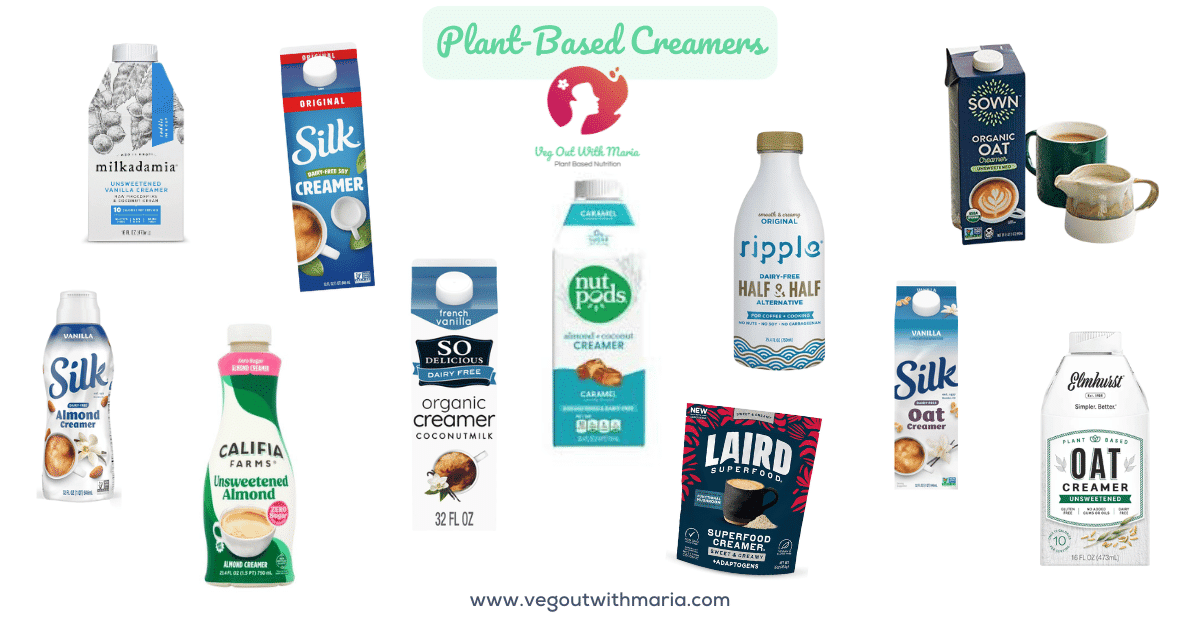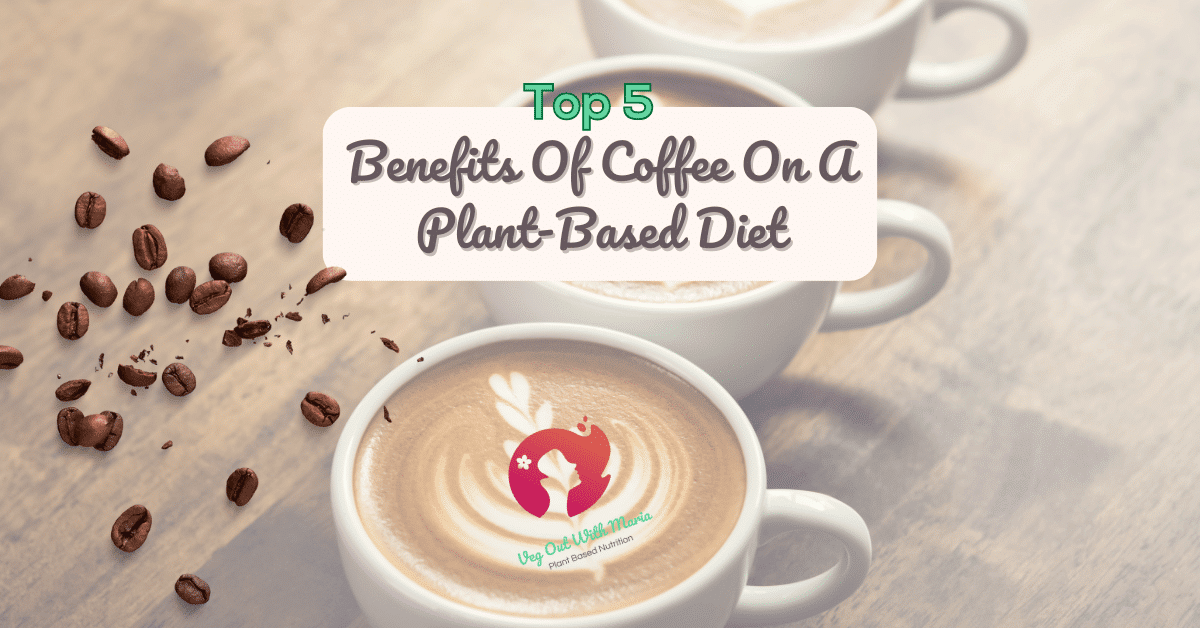Updated 10/18/2025
Coffee is one of the most popular beverages on the planet. Over 1 billion people worldwide and around 150 million Americans (~50%) drink coffee every day. That’s a lot of cups of coffee! But how does it fit into a plant-based diet, and are there health benefits to drinking coffee?
We will explore the top five benefits of drinking coffee, how it fits into a plant-based lifestyle, and I’ll specifically address how coffee and caffeine affect women in menopause.
Is Coffee Plant-Based?
Let’s start with the obvious. Coffee comes from the Coffea plant, so it is naturally plant-based. Also, there are no animal ingredients added during the harvesting and roasting of coffee beans so you can relax knowing that your cup of coffee is completely vegan.
What can make coffee not-so plant-based friendly is the addition of cow’s milk, cream, or milk-based creamers. A lot of Starbucks coffee drinks, creamers, and canned coffee beverages contain milk.
Luckily, it’s pretty easy to sub a plant-based milk (almond, soy, coconut, oat) or use a plant-based creamer instead.
Top 5 Benefits Of Drinking Coffee
You are probably familiar with the numerous health benefits associated with eating a plant-based diet. But did you know your cup of coffee can also offer many of the same benefits?
That’s the power of plants. No matter what the form, naturally occurring plant compounds provide protective benefits. Let’s take a look at the top five benefits associated with drinking coffee.
1. Anti-inflammatory: Rich in Antioxidants and Polyphenols
Coffee is one of the richest sources of antioxidants in the average diet. These compounds, including chlorogenic acid and other polyphenols, combat oxidative stress and inflammation by neutralizing free radicals.
Oxidative stress is a contributing factor in aging, chronic diseases, and hormonal imbalances, making antioxidants especially beneficial for women as they age.
Randomized controlled trials have shown that long-term coffee consumption (>4 weeks) is associated with a decrease in inflammation, oxidative stress, adipose (fat) tissue function, body mass index, reduction in blood pressure, and improved insulin sensitivity.1
This, in turn, can reduce your risk for cardiovascular disease, type 2 diabetes, metabolic syndrome, fatty liver disease, and other chronic diseases.
Women, particularly postmenopausal women, are at a higher risk for cardiovascular disease due to declining estrogen levels, so coffee’s heart-protective properties can be particularly valuable.
2. Enhances Physical and Mental Energy

Coffee enhances physical and mental energy primarily through its caffeine content and bioactive compounds. Here’s how it works:
Boosts Physical Energy and Athletic Performance
Increases Alertness: Caffeine blocks adenosine, a neurotransmitter that promotes sleepiness, leading to increased alertness and reduced fatigue.
Improves Exercise Performance: Caffeine stimulates the nervous system, increasing adrenaline levels, which prepares the body for physical exertion. It can enhance endurance and reduce perceived effort during workouts, making exercise feel easier. Aerobic endurance (running, hiking, cycling, swimming) appears to have the most consistent benefits from caffeine use.2
Supports Fat Utilization: Caffeine helps the body utilize stored fat as an energy source, which can be particularly beneficial during aerobic activities.
Interestingly, the ability of caffeine to enhance fat oxidation during exercise was higher in more sedentary individuals than in active, trained athletes.3 Also, higher coffee consumption has been associated with significantly lower total body fat percentage in women.4
3. Lower Incidence of Cancer and Decreased Risk of Mortality
There has been extensive research confirming an association between high coffee consumption and a decreased cancer risk, including colon, rectal, liver, breast, and endometrial cancer. In addition, there is evidence that coffee intake can decrease your risk of death from any cause.5
How can coffee have such a profound effect? With over 1000 different chemical compounds found in roasted coffee, it is difficult to pinpoint the exact mechanism but there are a few theories.
Besides its rich content of antioxidants and polyphenols which combat oxidative stress and reduce inflammation, these bioactive compounds found in coffee can contribute to its cancer-protective mechanisms.
May Reduce DNA Damage
Some compounds in coffee, such as diterpenes (cafestol and kahweol), are thought to enhance the body’s ability to repair damaged DNA, reducing mutations that can lead to cancer.6,7
Helps Regulate Hormones & Liver Enzymes
Breast and Endometrial Cancer: By modulating circulating estrogen levels, coffee may lower the risk of hormone-sensitive cancers, particularly in postmenopausal women.8,9,10
Liver Cancer: Coffee consumption has been shown to decrease the risk of liver cancer, particularly hepatocellular carcinoma (HCC). This protective effect is linked to coffee’s unique composition of antioxidants, anti-inflammatory compounds, and bioactive molecules that support liver health.11,12
Coffee supports the liver’s ability to detoxify harmful substances by increasing the activity of liver enzymes that break down toxins and carcinogens. This reduces the liver’s exposure to substances that could lead to cancerous changes.
Encourages Apoptosis (Cell Death)
Coffee compounds, such as diterpenes, may promote apoptosis, the programmed death of damaged or potentially cancerous cells, while protecting healthy cells.
4. Supports Gut Health

Coffee can support gut health in several ways, thanks to its bioactive compounds, including polyphenols, caffeine, and fiber.
Wait, coffee has fiber? The USDA will list 0g but researchers have found that the average cup can contain around 1.5g which is something!13
Stimulates Gut Motility: Coffee acts as a natural stimulant for the digestive system, promoting bowel movements by increasing the contractions of the intestinal muscles (peristalsis). This helps prevent constipation and supports regularity.
Rich in Antioxidants and Polyphenols: The polyphenols in coffee have prebiotic-like properties, meaning they can feed beneficial gut bacteria, such as Bifidobacteria. A healthy gut microbiome is linked to better digestion, immune function, and reduced inflammation.14
Enhances Bile Production: Coffee stimulates the production of bile in the liver, which aids in fat digestion, and reduces your risk of gallstones, supporting overall gut function.15
5. Mental Health & Mood Regulation
Every morning I wake up looking forward to my cup of coffee! It definitely gives me a mood boost but coffee also has other brain health benefits.
Sharpens Concentration: Caffeine stimulates the release of dopamine and norepinephrine, neurotransmitters associated with focus and motivation.
Improves Memory and Cognitive Function: Coffee has been linked to enhanced short-term and long-term memory and reaction times, making it easier to handle mentally demanding tasks.16
Protects Brain Cells: Chlorogenic acids and other antioxidants in coffee reduce oxidative stress and inflammation in the brain, protecting neurons from damage and potentially lowering the risk of neurodegenerative diseases like Alzheimer’s and Parkinson’s.17, 18
Elevates Mood: The bioactive compounds in coffee, including polyphenols, can reduce oxidative stress in the brain and increase the production of serotonin, which helps improve mood and combat symptoms of depression or stress. Bring it!
Most of these benefits can also be found in decaffeinated coffee as well, which is good news for those who are sensitive to caffeine.

Caffeine and Menopause: How Coffee Can Affect You
There have been conflicting studies looking at the association of coffee intake with increased menopausal symptoms. Some potential risks are:
Hot Flashes
Caffeine may exacerbate hot flashes in some women by increasing body temperature and stimulating the nervous system. However, when looking at the total antioxidant capacity of your diet (including fiber, coffee) and total physical activity, the reverse was found.
A high total antioxidant capacity was associated with a reduction in hot flashes and sweating, sleep problems, anxiety, exhaustion, and difficulty concentrating.19 This is good news for plant-based eaters whose fiber and total antioxidant intakes are usually high.
Bone Health Concerns
Excessive caffeine intake can interfere with calcium absorption, potentially impacting bone density—a concern for menopausal women already at risk for osteoporosis. This correlation is only found in high caffeine drinkers (>/= 4 cups of coffee a day).
Drinking 2–3 cups of coffee a day may actually lower risk of hip fracture in postmenopausal women.20 Making sure you are getting enough calcium and magnesium in your diet is also important. Here is a list some of the Best Plant-Based Calcium Sources. Also check out the blog: Magnesium For Perimenopause.
It’s recommended to wait a couple of hours before or after drinking coffee before taking calcium or magnesium supplements to ensure better absorption.
Although diet is important, don’t forget about the importance of exercise and strength training on overall bone health. Physical activity is a protective factor for bone mass retention in post menopausal women.21
Sleep Disruption
Caffeine can worsen insomnia or disrupt sleep patterns, which are often already affected during menopause. So, the key is timing your intake of coffee well before bedtime.
Everyone has their own individual tolerance, so find what works for you to ensure your sleep time is protected.
Who Should Not Drink Coffee?
While coffee offers many health benefits, it may not be suitable for everyone. The following groups of people should limit or avoid coffee consumption:
If You Are Pregnant or Breastfeeding
Caffeine passes through the placenta to the baby and can be harmful to the fetus. Pregnant women should aim for less than 200 mg of caffeine per day.
Children and Teens
Children and adolescents can be especially sensitive to caffeine’s effects, so coffee intake is not generally recommended.
People on Certain Medications
Caffeine can interact with certain medications, including medicine for blood pressure, thyroid, ADHD, asthma, tricyclic antidepressants, birth control pills, antibiotics, blood thinners, and diabetes medication.
Coffee’s effects can either be enhanced with some of these medications (such as birth control, antibiotics) or coffee can interfere with the absorption of some of these medications (thyroid medication).
So, if you are on any of these medications make sure you research the timing of coffee or the need to limit it.
If You Are Sensitive To Caffeine
Of course, if you know you are sensitive to coffee it might be best to avoid it. If you experience side effects such as heartburn, nervousness, anxiety, jitteriness, or insomnia, consider cutting back, choosing decaffeinated, or another beverage of choice.
Plant-Based Creamers
If you know coffee is your jam and you are plant-based, then listen up. While a lot of premade coffee drinks are traditionally made with regular cow’s milk, rest assured you have plenty of other plant-based options available to you.
Obviously, you can replace milk with a plethora of other way better plant-based options. There’s soy, oat, almond, macadamia, hemp, rice, pea, and coconut milk to name a few.
The following are a few plant-based creamer options. My personal favorite, although not with perfect ingredients as it does contain natural flavors, is Nut Pods. Their unsweetened version (vanilla, hazelnut, or original) gives the richness of cream without the dairy or the sugar.

Benefits Of Coffee On A Plant-Based Diet: Bottomline
Coffee synergistically works with an antioxidant-rich plant-based diet to support your overall health. With it’s inflammation-fighting antioxidant and polyphenol content, gut and mood-enhancing properties, coffee can make an ideal addition to support both your physical and mental well-being.
The sweet spot seems to be 2-3 cups or up to 400mg of caffeine a day. Drinking more than 4 cups a day appears to be associated with more risk than benefit.
As you can see, there are many plant-based milks and creamers to choose from. When it comes to choosing your coffee, I would recommend that you choose organic coffee beans as this crop is heavily sprayed with pesticides, herbicides, or fertilizers. This promotes a healthier environment and protects the health of both you and the farmers.
So, whether you choose decaf or regular, you can enjoy your morning coffee and it’s potential added benefits. You deserve it!



Great article packed with tons of helpful data.